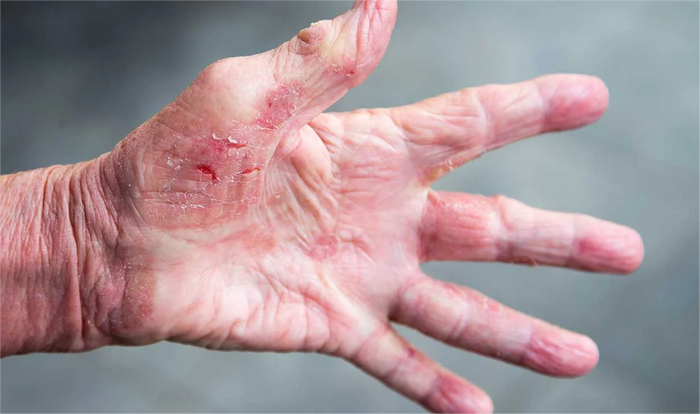Venous eczema, also known as stasis dermatitis, is a common condition that typically affects individuals with poor circulation, particularly those with varicose veins or chronic venous insufficiency. It manifests as inflammation and irritation of the skin, usually in the lower legs, and can lead to significant discomfort if left untreated. This article aims to provide a thorough understanding of venous eczema and offer a comprehensive guide on its treatment and management.
What is Venous Eczema?
Venous eczema is a type of dermatitis that occurs when there is increased pressure in the veins of the lower legs, leading to fluid leakage into the surrounding tissues. This results in skin inflammation, irritation, and, ultimately, the development of eczema. The condition is most prevalent among older adults, particularly women, and those with a history of varicose veins or deep vein thrombosis.
Symptoms and Diagnosis
Venous eczema typically presents with the following symptoms:
- Redness and inflammation of the skin
- Itching and irritation
- Swelling in the lower legs
- Crusting or weeping of the skin
- Brownish discoloration due to hemosiderin deposits
- Thickening and hardening of the skin in chronic cases (lipodermatosclerosis)
Diagnosis is usually clinical, based on the appearance of the skin and the patient’s medical history. However, additional tests such as Doppler ultrasound may be conducted to assess the underlying venous insufficiency.
Risk Factors
Several factors can increase the risk of developing venous eczema:
- Age: The risk increases with age.
- Gender: Women are more prone to this condition.
- History of varicose veins or venous insufficiency.
- Obesity, which increases pressure on the veins.
- Prolonged standing or sitting.
- Pregnancy, which can affect venous circulation.
- Previous deep vein thrombosis.
Pathophysiology
The primary underlying cause of venous eczema is chronic venous insufficiency. This condition leads to increased venous pressure, which causes the veins to become distended and leaky. The leakage of blood components into the skin leads to inflammation, irritation, and the typical symptoms of eczema. Chronic inflammation can further damage the skin and underlying tissues, resulting in complications such as ulceration.
SEE ALSO: How to Treat Seborrheic Dermatitis on Hair
Treatment Strategies
The treatment of venous eczema involves addressing both the skin condition and the underlying venous insufficiency. A multifaceted approach is often necessary to manage the symptoms effectively and prevent recurrence.
1. Compression Therapy
Compression therapy is the cornerstone of treatment for venous eczema. By applying graduated compression stockings or bandages, the venous pressure is reduced, promoting better blood flow and reducing swelling. Compression therapy helps prevent fluid leakage and alleviates the symptoms of eczema. Patients should be fitted for the appropriate compression garments and instructed on their proper use.
2. Topical Treatments
Topical treatments aim to reduce inflammation, soothe irritated skin, and prevent infection. The following types of topical treatments are commonly used:
- Corticosteroids: Topical corticosteroids are the mainstay of treatment for reducing inflammation and itching. They should be used under medical supervision to avoid potential side effects from prolonged use.
- Emollients: Regular application of emollients helps to moisturize and protect the skin. They prevent dryness and cracking, which can exacerbate eczema.
- Antibiotics: In cases where there is secondary bacterial infection, topical or oral antibiotics may be prescribed.
SEE ALSO: How to Treat Eczema Patches on Legs
3. Systemic Treatments
In severe cases, systemic treatments may be necessary to control the inflammation and prevent complications:
- Oral Corticosteroids: For acute exacerbations, short courses of oral corticosteroids may be used.
- Antibiotics: Systemic antibiotics are used if there is evidence of infection.
- Immunosuppressants: In refractory cases, immunosuppressive agents like methotrexate or cyclosporine may be considered.
4. Addressing Underlying Venous Insufficiency
Treating the underlying venous insufficiency is crucial to managing venous eczema. Several procedures can be used to improve venous circulation:
- Endovenous Laser Therapy (EVLT): This minimally invasive procedure uses laser energy to close off damaged veins.
- Sclerotherapy: A chemical solution is injected into the affected veins, causing them to close and reroute blood through healthier veins.
- Vein Stripping: In more severe cases, surgical removal of damaged veins may be necessary.
5. Lifestyle Modifications
Making certain lifestyle changes can help manage venous eczema and prevent recurrence:
- Weight Management: Maintaining a healthy weight reduces pressure on the veins.
- Exercise: Regular physical activity, particularly walking, helps improve circulation.
- Elevating the Legs: Elevating the legs above heart level several times a day can reduce swelling and improve venous return.
- Avoiding Prolonged Standing or Sitting: Taking breaks to move around can prevent the buildup of pressure in the veins.
Complications
If left untreated, venous eczema can lead to several complications:
- Venous Ulcers: Chronic inflammation can lead to the development of painful ulcers, which are difficult to heal.
- Infection: The compromised skin barrier increases the risk of bacterial infections.
- Lipodermatosclerosis: Chronic inflammation can cause the skin and underlying tissues to harden, leading to permanent changes.
Prevention
Preventing venous eczema involves addressing the risk factors and maintaining good skin care practices:
- Regular Use of Compression Stockings: Especially for individuals with a history of venous insufficiency.
- Skin Care: Keeping the skin moisturized and avoiding irritants.
- Monitoring for Early Signs: Early treatment of varicose veins or leg swelling can prevent the development of eczema.
Conclusion
Venous eczema is a common condition that requires a comprehensive approach to treatment and management. By addressing both the skin symptoms and the underlying venous insufficiency, patients can achieve significant relief and prevent complications. Compression therapy, topical and systemic treatments, lifestyle modifications, and medical procedures all play a role in managing this condition effectively. Regular follow-up and preventive measures are essential to ensure long-term success and improve the quality of life for those affected by venous eczema.
Related Topics:



























